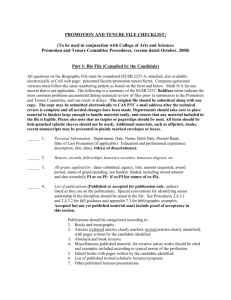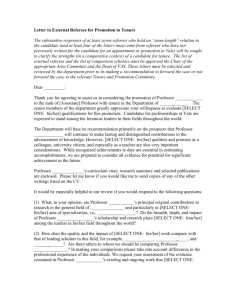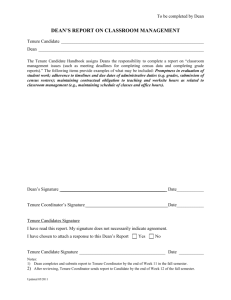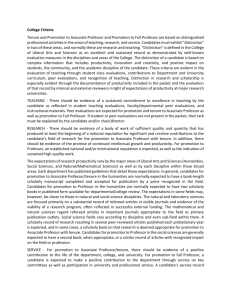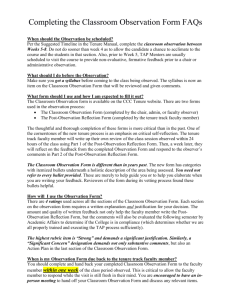Economics Department
advertisement
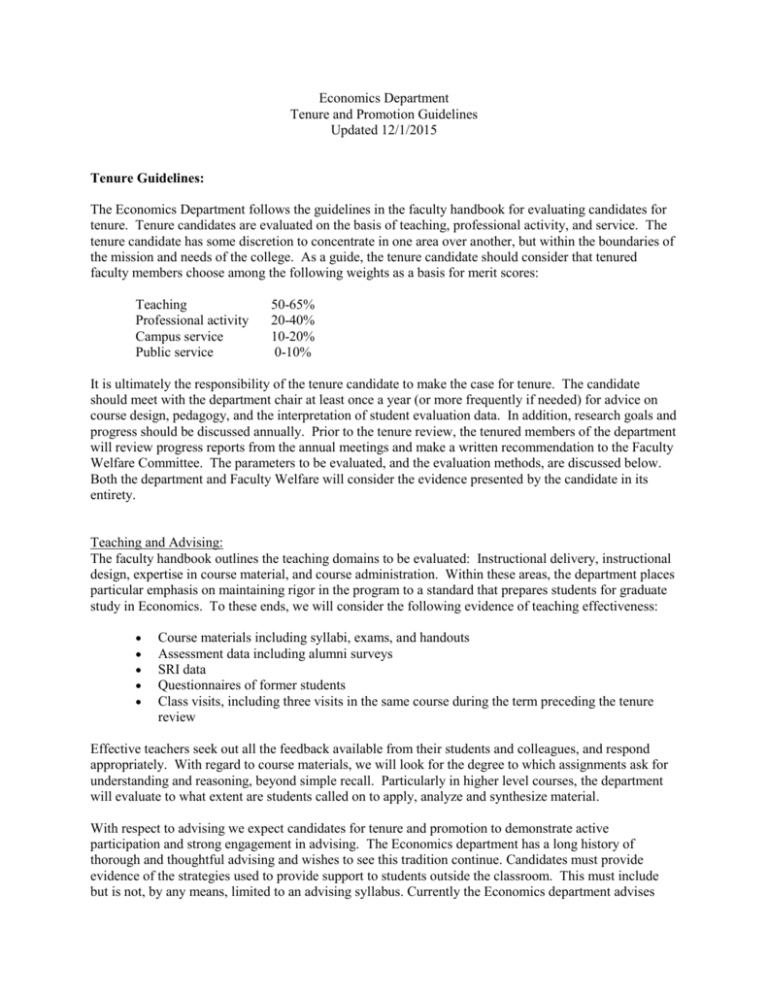
Economics Department Tenure and Promotion Guidelines Updated 12/1/2015 Tenure Guidelines: The Economics Department follows the guidelines in the faculty handbook for evaluating candidates for tenure. Tenure candidates are evaluated on the basis of teaching, professional activity, and service. The tenure candidate has some discretion to concentrate in one area over another, but within the boundaries of the mission and needs of the college. As a guide, the tenure candidate should consider that tenured faculty members choose among the following weights as a basis for merit scores: Teaching Professional activity Campus service Public service 50-65% 20-40% 10-20% 0-10% It is ultimately the responsibility of the tenure candidate to make the case for tenure. The candidate should meet with the department chair at least once a year (or more frequently if needed) for advice on course design, pedagogy, and the interpretation of student evaluation data. In addition, research goals and progress should be discussed annually. Prior to the tenure review, the tenured members of the department will review progress reports from the annual meetings and make a written recommendation to the Faculty Welfare Committee. The parameters to be evaluated, and the evaluation methods, are discussed below. Both the department and Faculty Welfare will consider the evidence presented by the candidate in its entirety. Teaching and Advising: The faculty handbook outlines the teaching domains to be evaluated: Instructional delivery, instructional design, expertise in course material, and course administration. Within these areas, the department places particular emphasis on maintaining rigor in the program to a standard that prepares students for graduate study in Economics. To these ends, we will consider the following evidence of teaching effectiveness: Course materials including syllabi, exams, and handouts Assessment data including alumni surveys SRI data Questionnaires of former students Class visits, including three visits in the same course during the term preceding the tenure review Effective teachers seek out all the feedback available from their students and colleagues, and respond appropriately. With regard to course materials, we will look for the degree to which assignments ask for understanding and reasoning, beyond simple recall. Particularly in higher level courses, the department will evaluate to what extent are students called on to apply, analyze and synthesize material. With respect to advising we expect candidates for tenure and promotion to demonstrate active participation and strong engagement in advising. The Economics department has a long history of thorough and thoughtful advising and wishes to see this tradition continue. Candidates must provide evidence of the strategies used to provide support to students outside the classroom. This must include but is not, by any means, limited to an advising syllabus. Currently the Economics department advises 108 students (majors and minors as well as first year students and student athletes). Professional activity: Each member of the department is expected to have an active research program, with the ultimate goal of peer-reviewed publication. It is not mandatory to have a publication by a certain date, or in a certain type of journal, for tenure. Acceptable research programs include: traditional scholarly research, research on the scholarship of teaching economics, and scholarly applied work (for example, meaningful consulting). Annual conference or workshop attendance with the appropriate group(s) is considered an essential sign of an active research program. Occasional paper, poster, or workshop presentations are preferred. This sort of interaction with peers is crucial to staying current in the discipline, and provides valuable feedback. In turn, such interaction improves publishing success, and may lead to further invitations to contribute book reviews, serve as a discussant, etc. To summarize: Activity: Product : Expected Conference attendance Progress toward publication Preferred Conference presentation Peer-reviewed publication In making a tenure recommendation, the department will assess the quality and importance of the candidate’s work. In the case of unpublished work, the department will request drafts of the work. Quality scholarship is engaging and relevant. The candidate is strongly encouraged to solicit letters from experts in the field, who can testify to the work’s quality and potential. In addition, the following activities are encouraged: Serving as a conference discussant, panelist, or organizer Serving as a journal editor or referee Published book reviews and encyclopedia contributions Research grants and awards Service: The candidate has significant freedom to choose a service focus. At minimum, the department needs all members to participate in annual assessment activities, and participate in basic governance and advising. We assume that the opportunities for service increase as the knowledge, experience, and maturity prepare the candidate to take a leadership role. This implies that eventually, at the department level, service as chair would be expected. At the college level, it means chairing and/or serving on major committees would be expected eventually. Throughout the candidate’s career, the candidate should demonstrate contributions to the college through service on committees, first-year advising, etc. Finally, if the candidate participates in public service, it should reflect well on the department and the college. Service to the public is not expected, but would be considered an excellent demonstration of the candidate’s commitment to the profession and serving the college by representing it in the broader community. This is an area that should experience growth from the tenure hearing to the promotion decision. All of the following are encouraged service activities: Committee service and leadership First-year and major advising Sponsoring student groups Participating in study abroad programs Participating in college recruitment Teaching in the general education program Public lectures Community service and leadership Promotion guidelines: Candidates for promotion are evaluated according to the weights listed above for teaching, professional activity, and service. The candidate for promotion is expected to provide similar evidence of effectiveness in teaching, research, and service as listed above for tenure. Following faculty handbook guidelines, student evaluation data for all course sections taught since the granting of tenure should be reviewed and thoughtfully considered in the department chair’s letter assessing the promotion candidate. The assessment of teaching should not be based solely on evaluations but should –at a minimum- be based on regular teaching observations (conducted by tenured members of the department in the years leading up to promotion) and a review of the promotion candidate’s course materials (syllabi, assignments, handouts, and so on) as well. The department chair will consult the members of the department faculty at Professor rank and include their assessment in the letter. With respect to research the department would like to maintain somewhat more flexibility with regard to its research expectations when considering promotion. Specifically, the department would like to place less emphasis on publication than it does for tenure to allow the tenured faculty member the freedom to work on longer works, interdisciplinary research, or consulting.
